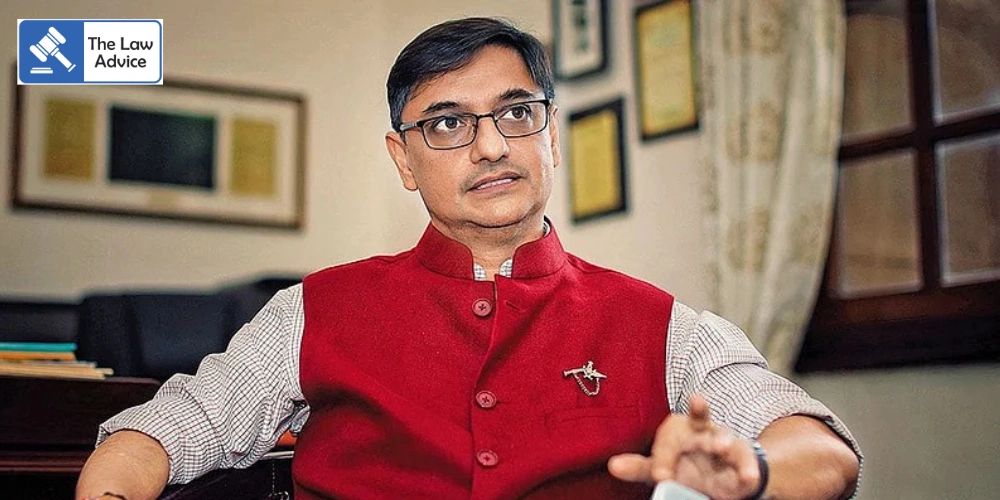Two Supreme Court advocates have written to the Attorney General of India seeking consent to initiate criminal contempt proceedings against noted economist Sanjeev Sanyal, a Member of the Economic Advisory Council to the Prime Minister (EAC-PM), over his sharp criticism of the judiciary and the legal profession.
The request, dated September 25, 2025, was made jointly by Mr. Rohit Pandey, advocate and former Secretary of the Supreme Court Bar Association (SCBA), and Mr. Ujjawal Gaur, a young advocate and member of the SCBA. The letter, invoking Section 15 of the Contempt of Courts Act, 1971, seeks the Attorney General’s sanction—a mandatory prerequisite before contempt proceedings can be initiated against individuals for statements made outside the court.
In his recent public address, Mr. Sanyal made a series of remarks that the advocates allege undermine the dignity and credibility of the judiciary. Among other things, he reportedly said:
• The judicial system is “the single biggest hurdle to becoming Viksit Bharat and growing rapidly.”
• Judicial traditions, such as addressing judges as “My Lord” or calling pleadings “prayers”, were “outdated” and “mockable.”
• The judiciary is “a public service like any other,” and judicial vacations are equivalent to doctors deciding to shut down hospitals during festivals.
• Pre-litigation mediation under Section 12A of the Commercial Courts Act, 2015, is a “failed system” that adds unnecessary costs, allegedly pushed by the legal profession despite its ineffectiveness.
• The legal profession was described as a “medieval guild with a caste system of stratification”—questioning the existence of senior advocates, advocates-on-record, and even whether a law degree is necessary to argue before courts.
• The judiciary itself, he suggested, suffers from a “caste system” between judges elevated from the Bar and those promoted from the Subordinate Judiciary.
The letter argues that these remarks, especially when made by a senior government advisor, go beyond criticism and amount to “sweeping attacks” on both the judiciary and the Bar .
Advocates’ Concerns
In his statement, Mr. Rohit Pandey stressed that Mr. Sanyal’s repeated remarks risk diminishing public trust:
“While Mr. Sanyal has contributed significantly as an economist, his repeated public remarks denigrating the judiciary and the Bar are deeply troubling. These are not mere observations, they are sweeping attacks that question the integrity, impartiality, and dedication of our judges and lawyers. Statements from someone in such a high advisory position carry enormous weight and risk creating the impression that they reflect the views of the central government itself. If left unchecked, such remarks may seriously erode public confidence in our judicial institutions, which are the backbone of democracy.”
Supporting this view, Mr. Ujjawal Gaur emphasised the dedication of judges and lawyers to the cause of justice:
“Mr. Sanjeev Sanyal is a credible and respected individual, and I acknowledge his significant contributions as an economist and policy advisor. At the same time, coming from outside the legal profession, he may not fully appreciate the dedication of judges and lawyers. Given his high-ranking position, such public remarks risk being perceived as reflecting the views of the central government, rather than personal opinion, which could erode public faith in the judiciary.”
Gaur also recalled his law school experiences, working closely with judges of the Supreme Court of India and the Delhi High Court, where he observed that many justices and advocates “work tirelessly far beyond formal hours, and often continue work even during vacations to ensure justice is not delayed.”
The request rests on Section 15 of the Contempt of Courts Act, 1971, which governs how the Supreme Court or High Courts can take cognisance of criminal contempt arising out of statements or publications made outside court proceedings.
Criminal contempt, as defined under the Act, includes any publication that “scandalises or tends to scandalise, or lowers or tends to lower the authority of any court.” Since the remarks in question were made in a public forum, the advocates cannot directly move the Supreme Court without first obtaining the consent of the Attorney General.
The Attorney General’s consent acts as a filter mechanism—ensuring that only cases with a genuine risk of undermining judicial authority proceed, while preventing frivolous or excessive use of contempt jurisdiction that might stifle legitimate criticism.
This move has sparked debate within the legal community about the delicate balance between freedom of expression and protection of judicial institutions.
On the one hand, critics argue that contempt proceedings should not be used to silence legitimate criticism of courts or the legal system. On the other, supporters of the advocates’ move insist that Mr. Sanyal’s remarks, particularly the branding of the judiciary as the “single biggest hurdle” to national growth, go beyond critique and amount to institutional denigration.
The controversy also highlights recurring tensions between executive advisors and the judiciary, with concerns that comments from individuals in influential government positions may be seen as carrying an official stamp of approval, whether intended or not.
The Attorney General of India will now examine the request and decide whether to grant consent for contempt proceedings. If granted, the matter could be taken up by the Supreme Court of India, potentially resulting in a high-profile case that tests the boundaries of judicial contempt law in India.
Such proceedings could also reignite calls for a re-examination of India’s contempt jurisprudence, especially given past Supreme Court rulings that have tried to balance free speech rights under Article 19(1)(a) with the need to protect the judiciary’s authority under Article 129 and 215 of the Constitution.
At its core, the controversy underscores a fundamental democratic question: How much criticism of the judiciary is too much? While robust debate and calls for reform are hallmarks of democracy, sweeping attacks that risk eroding public confidence in justice delivery institutions may cross the line into contempt.
With two senior advocates formally seeking intervention, the Attorney General’s decision in this case will be closely watched—not only for its legal significance but also for its impact on the ongoing dialogue between judicial independence, public accountability, and free expression.
